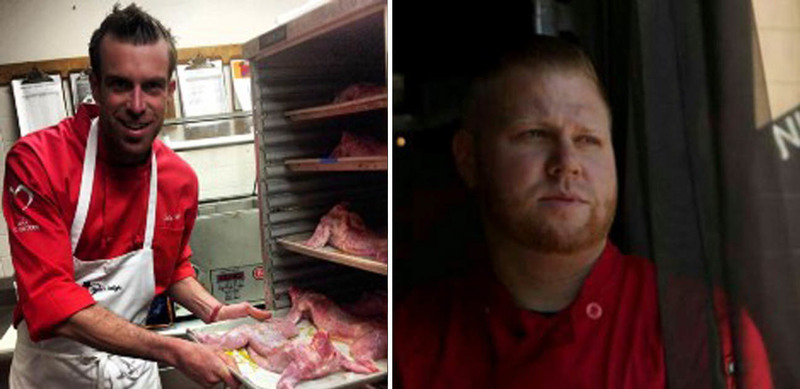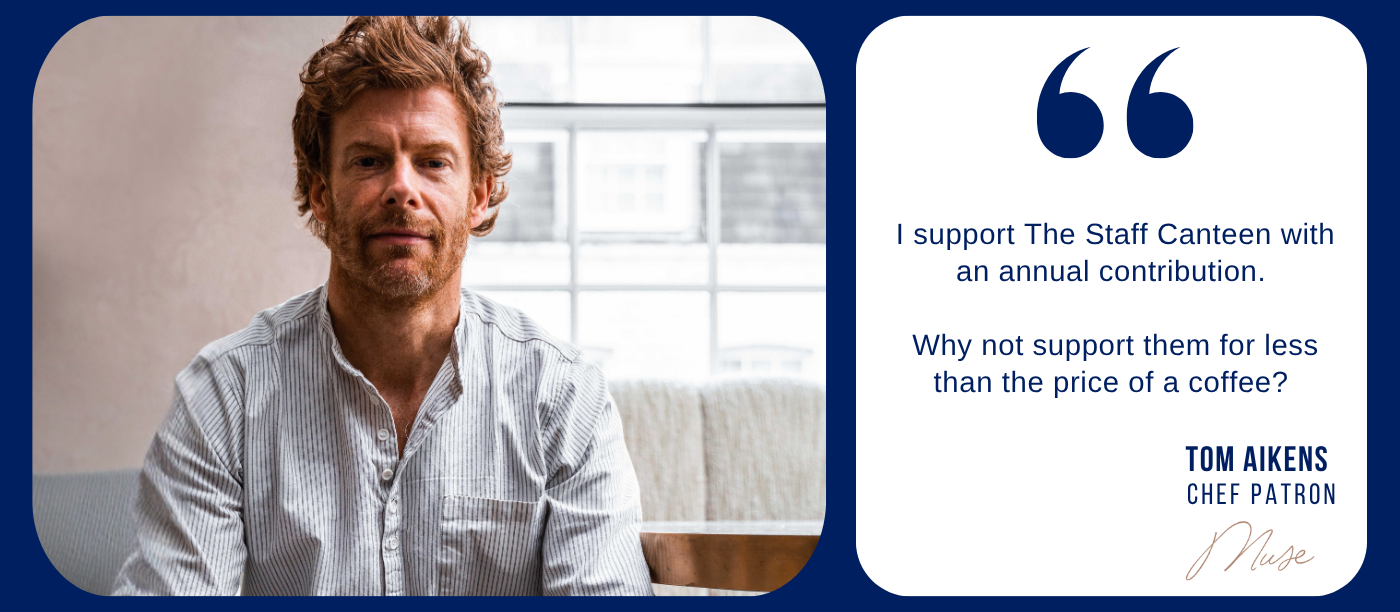sex, drugs and booze culture, but the culture of connectedness, teamwork, personal sacrifice, creativity, innovation.
The list goes on, and includes the darker sides as well: sub-par wages, high stress, difficult work environment, long hours. It’s a package deal and you have to be willing to take the good with the bad, but the bad is really more along the lines of challenging, and challenges make the good times so much better.
It’s been fun to see Eric make his way into the mainstream core of kitchen culture — I think his military background served him well — he’s used to the hard work, sacrifice and teamwork from serving two tours with the United States Army in Iraq. Of course he’d fit right in with all the ink up and down his arm. Plus, as much as usual cooks talk about the sacrifices we make — they are pale in comparison to the kind of sacrifices made by military.
3. People Matter — Everyone Matters
I’ve always taken tremendous pride in being a generous person by nature. Sometimes it comes back to haunt me, and I know I fall short from time to time — my intentions are there, though. If you are a manager of any kind and don’t live by this principle, you’re setting yourself up for failure. If you want to build and maintain a stellar team, you need to EARN the respect and trust of your employees — it starts there.
Your staff needs to know that you have their back, are invested in them, and have a sincere desire in seeing them succeed. Most managers are horrible at this simple, yet profound connection that’s to be made with one’s staff. Most managers don’t groom and mentor their employees, they just try to keep things in order. They are just fine with the status quo, as long as it doesn’t put their job in jeopardy.
Let’s say an integral member of your team leaves for a better opportunity… it’s a chance for them to move up in the world.
Are you proud for them or bitter at them?
Eric’s two year-anniversary at the restaurant came and passed as we joked about how far he had come. Probably a week later, he pulled me aside. He said we needed to talk.
Under his breath he said, ‘I have the opportunity to become the executive chef for a new restaurant in town.’
 ‘Congrats man!’, I cheered.
‘Congrats man!’, I cheered.
Sighing with relief, he went on to speak of how hard it was to build up the nerves to start that conversation. He thought we’d feel betrayed or mad and thought his job with us might be in jeopardy.
Like an older brother seeing a younger version of himself, I looked at Eric, started chuckling, gave him a big hug, and said: ‘Dude, I couldn’t be happier or more proud of you. If you need any help, venturing into these uncharted territories, I’m here to help.’
For me, it’s all about the people, the relationships and leaving the next generation of cooks and chefs better than how I found it. It’s the teaching and personal growth that gives me more gratification than I ever could have imagined, but to be honest, I’d be lying if I said I hadn’t learned a number of things from him, as well
Most profoundly, the pieces that hit closest to home, for me, would be this:
Eric’s first stint as an executive chef didn’t go as planned. As things started spiralling out of control, he helplessly stepped aside and parted ways with the first kitchen he could call ‘his.’ He was bummed, and I’m sure he felt like he let me down, or if nothing else, really wanted to make me proud. To be honest, I really am.
Once again, he peeled himself off the floor, swallowed his pride and found another job as the sous for a different restaurant. Having been friends and co-workers for some four years now, I’m continually inspired by the perseverance he chooses to embrace. It’s hard getting knocked down and back up, over and over again. I’ve been there before, and there are times when I’ve wanted to throw in the towel and call it quits — it hurts, it’s hard and you feel like you are so backed up into a corner that there is no way out. The only way out, is to fight your through, and my good buddy and sous, Eric is a prime example of that.
So, Eric — to the hundred thousand or so people we served together —cheers to the food we made. We made it with care. To the relationships we built along the way. To the memories that we’ll take with us deep into life — Cheers, buddy.
P.S. Now it’s your turn to find someone to take under your wing…
 Chef Chris Hill left a job in the business world to follow his heart and passion into the world of cooking and the kitchen. Chris opened his first restaurant at 28 and grew into the role of executive chef.
Chef Chris Hill left a job in the business world to follow his heart and passion into the world of cooking and the kitchen. Chris opened his first restaurant at 28 and grew into the role of executive chef.
Having taken his experiences in the corporate world, as well as those in the kitchen, Chris has built a large social media following centered around TV appearances all over the Southeast U.S., his writing, TEDx talks, and his mission of helping industry workers to lead fulfilling, successful careers.
Chris' first book comes out in the Summer of 2016 and is a dive into what makes for a successful career in the restaurant world, and includes exclusive interviews with some of the world's leading and most respected chefs.
You can follow Chris on Facebook, Twitter and Instagram, and read more of his work here.


 Special moments they are indeed, but seeing and being a part of that for someone close to you? That’s as good as it gets. Eric, my sous chef for two years gave me gratification with a whole host of these moments as I saw him come into his own in the kitchen. For me, this is a perfect and continual reminder as to how much I love what I do.
Special moments they are indeed, but seeing and being a part of that for someone close to you? That’s as good as it gets. Eric, my sous chef for two years gave me gratification with a whole host of these moments as I saw him come into his own in the kitchen. For me, this is a perfect and continual reminder as to how much I love what I do. Most people use this as an opportunity to give in, they take the easy way out, because, well, life can be really hard. There are a number of important factors, but two primary indicators for failure or success are— time and effort, and you have control over both. How bad you want something, is directly correlated to how much (or little) time you spend and the amount of actual effort you exert, in order to achieve that desired result.
Most people use this as an opportunity to give in, they take the easy way out, because, well, life can be really hard. There are a number of important factors, but two primary indicators for failure or success are— time and effort, and you have control over both. How bad you want something, is directly correlated to how much (or little) time you spend and the amount of actual effort you exert, in order to achieve that desired result. The fact is your work, whatever you do, is going to follow you around and become a part of you — it’s a big piece you, so I hope you enjoy it, and if you don’t, I hope you have the courage to walk away and start over. If you’re debating a life in the kitchen, know that to truly belong, you have to buy into the culture — not the Anthony Bourdain
The fact is your work, whatever you do, is going to follow you around and become a part of you — it’s a big piece you, so I hope you enjoy it, and if you don’t, I hope you have the courage to walk away and start over. If you’re debating a life in the kitchen, know that to truly belong, you have to buy into the culture — not the Anthony Bourdain
 ‘Congrats man!’, I cheered.
‘Congrats man!’, I cheered. Chef Chris Hill left a job in the business world to follow his heart and passion into the world of cooking and the kitchen. Chris opened his first restaurant at 28 and grew into the role of executive chef.
Chef Chris Hill left a job in the business world to follow his heart and passion into the world of cooking and the kitchen. Chris opened his first restaurant at 28 and grew into the role of executive chef.









